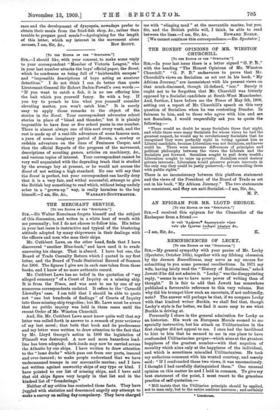THE MERCHANT SERVICE.
[To THE EDITOR OP THE "SPECTATOR."] SIR,—Sir Walter Runciman forgets himself and the subject of this discussion, and writes in a white heat of wrath with me personally ; but I do not choose to follow him. His letter in your last issue is instructive and typical of the blustering attitude adopted by many shipowners in their dealings with the officers and men who man their ships.
Mr. Cuthbert Laws, on the other hand, finds that I have discovered "another Blue-book," and have used it to evade answering his charge. That is absurd. I have but one, the Board of Trade Casualty Return which I quoted in my first letter, and the Board of Trade Statistical Record of Seamen for 1906. The figures I give are in each case taken from these books, and I know of no more authentic record.
Mr. Cuthbert Laws has no belief in the quotation of "my alleged summary" of a Court of Inquiry on a missing ship. It is from the Times, and was sent to me by one of my numerous correspondents undated. It refers to the ' Carnedd Llewellyn' case. I am told that I should be able to quote not "one but hundreds of findings" of Courts of Inquiry into these missing-ship tragedies ; but Mr. Laws must be aware that no public inquiry was held in these cases until the recent Order of Mr. Winston Churchill.
And, Sir, Mr. Cuthbert Laws must know quite well that my letter was called forth in answer to a remark of your reviewer of my last novel ; that both that book and its predecessor and my letter were written to draw attention to the fact that by Mr. Lloyd George's action in 1906 the legislation of Plimsoll was destroyed. A new and more hazardous load- line has been adopted; deck-loads may now be carried across the Atlantic by our ships. I have written to draw attention to the "lame ducks" which pass out from our ports, insured and over-insured ; to make people understand that we have undermanned tramps in our mercantile marine ; and I have not written against seaworthy ships of any type or kind. I have pointed to our list of missing ships, and I have said that old ships figure very largely in that list and in the kindred list of "fonnderings."
Neither of my critics has contested these facts. They have juggled with statistics and denounced angrily any attempt to :make a survey on sailing day compulsory. They have charged me with " slinging mud " at the mercantile marine, but you, Sir, and the British public will, I think, be able to read














































 Previous page
Previous page